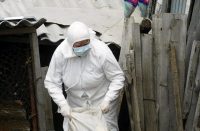
NEW YORK, United States (Reuters) — A new device from UE Live Sciences has the potential to drastically reduce the cost of breast cancer screenings for women around the globe.
The iBreast Exam earned top honors at the Hitlab Innovators Summit, a healthcare and technology conference and competition, at Columbia University in New York on Wednesday (November 30th).
“The iBreast Exam is a breast cancer screening device targeted at the developing world. It’s very small, easy to use, very cost effective, very accurate, very suitable for a demographic that isn’t necessarily a Western demographic where MRIs, for example, or mammograms would be the gold standard,” explained the CTO and co-founder of UE Life Sciences, Matthew Campisi.
“This device was developed with those drivers in mind so that we can reach as many women as possible in the developing world.”
The unit itself is barely larger than a computer mouse and works with a software application designed for tablets and smartphones, but the key to the device are the sensors on the it.
“We have developed electro-mechanical fingers made out of piezoelectric material that are able to measure stiffness of tissue. So, the basis of the technology is to do micropalpations that are hardly noticeable by the patient but they are capable of measuring in differences of tissue stiffness and that measurable difference is the difference between cysts, connective tissue, fatty tissue, or tumors,” said Campisi.
Already, UE Live Sciences has 200 units deployed in the field, mostly in India. One iBreast Exam device can do can do approximately 100 screenings before needing a recharge or battery replacement.
“While the procedure is going on and the results are captured in real time. We make a full image report at the point of care that gets saved locally and also gets saved to a cloud for further evaluation and for dashboard-like statistics that we can do demographic culling of data and things like that.”
The end result is an extremely cost effective mobile screening device for breast cancer.
“A mammogram is approximately $40 (USD) if you look at the costs. For an iBreast exam, we’re targeting something on the order of $0.50, the equivalent of fifty cents, which would be suitable for the richest of the rich and the poorest of the poor,” finished Campisi.







